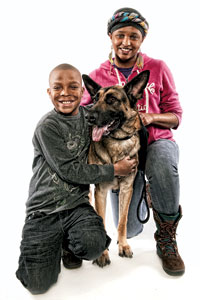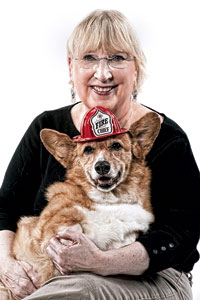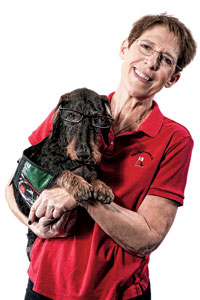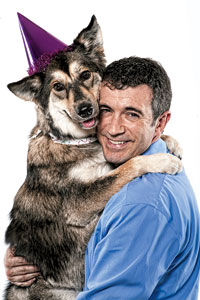|
The TeacherMany children Ryder meets in DC schools think the German shepherd is scary because he looks like a police dog. But then they get to know him and his owner, Shakela Brown, manager of the Washington Humane Society’s humane-education outreach program. Brown brings Ryder along to schools such as Bruce-Monroe Elementary in the District’s Columbia Heights and Hendley Elementary in Southeast DC. Her mission is to teach the kids to treat animals kindly and how they can report abused or stray pets. Because many of the animals rescued by the Humane Society come from the areas where the children live, getting through to the kids is a way to prevent future mistreatment of animals. Ryder is the most important part of Brown’s lesson. She says inner-city kids often associate dogs with police or fighting, but seeing Ryder up close “helps them empathize with him.” Ryder lets the kids pet him and rest their heads on him. Brown tells them he’s a good dog because she gives him lots of love—and Ryder is happy to give it right back. |
|
The Best FriendKate Condon didn’t think she was ready for another dog when her brother took her to the Washington Animal Rescue League in 2008. Condon’s 14-year-old Welsh Pembroke corgi had recently died, but her brother insisted on the visit. It so happened that the shelter had two corgis. Condon fell in love with the female. “She was real quiet but real sweet,” says Condon. “I just kind of connected with her.” She adopted her and named her Lucy. Condon—who is deaf but uses a hearing aid and cochlear implant—hired a trainer to teach Lucy to alert her to the doorbell and other sounds. One evening last September, she let Lucy sleep in bed with her. Because corgis have such short legs, they can injure their backs if they jump off furniture, so Condon didn’t usually let Lucy onto the bed. At 4:30 am, Lucy began pawing at Condon. Finally, Condon—who didn’t have her hearing devices in—opened her eyes. Realizing the first floor was full of smoke, she grabbed Lucy and escaped. The fire had started in the basement, but firefighters said it would have spread to her bedroom. Condon, who couldn’t hear the smoke alarm, wouldn’t have woken up if it weren’t for Lucy. And because Lucy is too short to jump onto the bed herself, Condon doesn’t know what would have happened if she’d made Lucy sleep on the floor. One thing’s for sure: Though Condon rescued Lucy from the shelter, Lucy has evened the score. |
|
The HealerRocky, a ten-year-old wirehaired dachshund, has a busy schedule. Depending on the day, he may be cuddling with hospital patients, hanging out with the elderly, or helping kids learn to read. Since 2001, he has volunteered as a therapy dog with Fidos for Freedom, a group based in Prince George’s County that arranges for pets to visit people who are sick or otherwise in need of comfort. Among Rocky’s favorite stops is the Cedar Lane School in Howard County, where he plays with developmentally disabled children and young adults. Most of the students can’t talk. Rocky’s owner, Beth Mittleman, says: “You can see that they’re relating in their body language or in their eye contact.” On Saturday mornings during the school year, Rocky heads to a library in Cooksville, Maryland, to work with third- and fourth-graders who struggle with reading. The kids are often embarrassed to read aloud, but Rocky doesn’t judge them. He sits still for 45 minutes while they read to him. Mittleman says Rocky’s best talent is snuggling in hospital beds. She’ll never forget one experience at Holy Cross Hospital when Rocky met a young woman dying of cancer. Though the woman was sedated, her mother said her daughter would want Rocky to sit on her bed. “Rocky lay right next to her, as he always does,” says Mittleman. “Her mother took a whole roll of pictures.” The woman died that night. Says Mittleman: “What Rocky did for that family was leave a very nice memory.” |
|
The MiracleVivian loves going for car rides—she rolls the window down by herself so she can feel the wind. She’s a dog who knows how to enjoy life. Less than two years ago, Vivian, along with her mother and three littermates, was a feral puppy living under a house in North Carolina. A neighbor called animal control, thinking the dogs would be put up for adoption at the shelter. When the officer showed up, Vivian’s mom and two of the puppies went right to him, but Vivian and her sister scurried back under the house. The officer left. When the neighbor called animal control to check on Vivian’s mom and two siblings, she was shocked to learn they had been euthanized. She called a friend who volunteers with Homeward Trails Animal Rescue in Arlington and asked her to get the two puppies still under the house. When a volunteer arrived, only one puppy was there. No one knows what happened to the other one. She brought the puppy to Washington and found her a foster home with another volunteer, Nicolas Macri. Macri planned to care for the puppy until the dog found a permanent home, but he decided to keep her: “She had these eyes. You looked at her, and she just had no idea what she’d been through.” He wanted her name to reflect her story. He chose Vivian—a reference to the Spanish word vivir, “to live.” Though Vivian is curious about most things, she’s still somewhat fearful of strangers. Macri is glad she has the instinct: “It’s that fear that saved her life.” |
|
The EscapeThe numbers and symbols tattooed on the cats’ ears are a reminder of their past as test subjects at a lab in North Carolina. Given the trauma Cookie and Muffin endured for their first 11 months, their trusting attitude—particularly toward their adopter, Florence Katrivanos—is remarkable. “The conditions were awful,” says Katrivanos. “They did not get any human affection. But from day one they were extremely loving.” Cookie and Muffin escaped as part of a rescue effort after a People for the Ethical Treatment of Animals investigator went undercover as a lab employee, exposing unsanitary conditions and abuse. More than 50 cats and 200 dogs were surrendered. Thirty ended up at the Washington Animal Rescue League. Katrivanos met Cookie and Muffin there and brought them to her Oakton home a year ago. It took $1,700 to nurse them back to health. Katrivanos says their resilience inspires her: “Sometimes life is really hard. I think, look at these two cats. There’s hope for all of us.” |
Photographs by Vincent Ricardel.
Se all Love Your Pets stories.
This article appears in the February 2012 issue of The Washingtonian.























